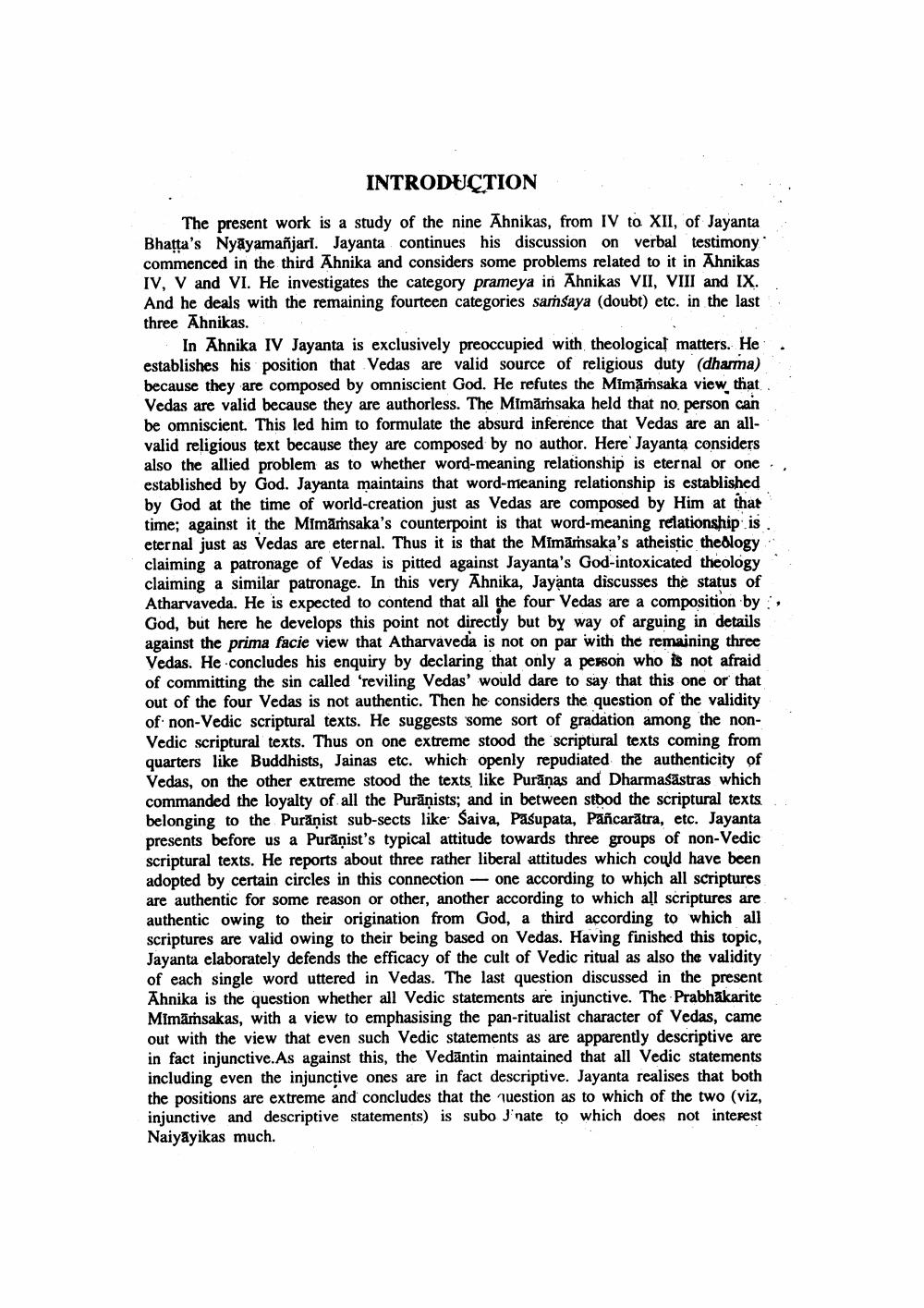Book Title: Indian Logic Part 03 Author(s): Nagin J Shah Publisher: Sanskrit Sanskriti Granthmala View full book textPage 7
________________ INTRODUCTION The present work is a study of the nine Ahnikas, from IV to XII, of Jayanta Bhatta's Nyāyamañjari. Jayanta continues his discussion on verbal testimony commenced in the third Ahnika and considers some problems related to it in Ahnikas IV, V and VI. He investigates the category prameya in Ahnikas VII, VIII and IX. And he deals with the remaining fourteen categories samsaya (doubt) etc. in the last three Ahnikas. In Ahnika IV Jayanta is exclusively preoccupied with theological matters. He . establishes his position that Vedas are valid source of religious duty (dharma) because they are composed by omniscient God. He refutes the Mimărsaka view that Vedas are valid because they are authorless. The Mimārsaka held that no, person can be omniscient. This led him to formulate the absurd inference that Vedas are an allvalid religious text because they are composed by no author. Here Jayanta considers also the allied problem as to whether word-meaning relationship is eternal or one.. established by God. Jayanta maintains that word-meaning relationship is established by God at the time of world-creation just as Vedas are composed by Him at that time; against it the Mimarsaka's counterpoint is that word-meaning relationship is eternal just as Vedas are eternal. Thus it is that the Mimarnsaka's atheistic theology claiming a patronage of Vedas is pitted against Jayanta's God-intoxicated theology claiming a similar patronage. In this very Ahnika, Jayanta discusses the status of Atharvaveda. He is expected to contend that all the four Vedas are a composition by , God, but here he develops this point not directly but by way of arguing in details against the prima facie view that Atharvaveda is not on par with the remaining three Vedas. He concludes his enquiry by declaring that only a person who is not afraid of committing the sin called 'reviling Vedas' would dare to say that this one or that out of the four Vedas is not authentic. Then he considers the question of the validity of non-Vedic scriptural texts. He suggests some sort of gradation among the nonVedic scriptural texts. Thus on one extreme stood the scriptural texts coming from quarters like Buddhists, Jainas etc. which openly repudiated the authenticity of Vedas, on the other extreme stood the texts like Purānas and Dharmasastras which commanded the loyalty of all the Purāņists; and in between stood the scriptural texts belonging to the Purāņist sub-sects like Saiva, Pasupata, Pancarātra, etc. Jayanta presents before us a Purāņist's typical attitude towards three groups of non-Vedic scriptural texts. He reports about three rather liberal attitudes which could have been adopted by certain circles in this connection - one according to which all scriptures are authentic for some reason or other, another according to which all scriptures are authentic owing to their origination from God, a third according to which all scriptures are valid owing to their being based on Vedas. Having finished this topic, Jayanta elaborately defends the efficacy of the cult of Vedic ritual as also the validity of each single word uttered in Vedas. The last question discussed in the present Ahnika is the question whether all Vedic statements are injunctive. The Prabhakarite Mimärsakas, with a view to emphasising the pan-ritualist character of Vedas, came out with the view that even such Vedic statements as are apparently descriptive are in fact injunctive.As against this, the Vedāntin maintained that all Vedic statements including even the injunctive ones are in fact descriptive. Jayanta realises that both the positions are extreme and concludes that the question as to which of the two (viz, injunctive and descriptive statements) is subo J'nate to which does not interest Naiyāyikas much.Page Navigation
1 ... 5 6 7 8 9 10 11 12 13 14 15 16 17 18 19 20 21 22 23 24 25 26 27 28 29 30 31 32 33 34 35 36 37 38 39 40 41 42 43 44 45 46 47 48 49 50 51 52 53 54 55 56 57 58 59 60 61 62 63 64 65 66 67 68 69 70 71 72 ... 226
